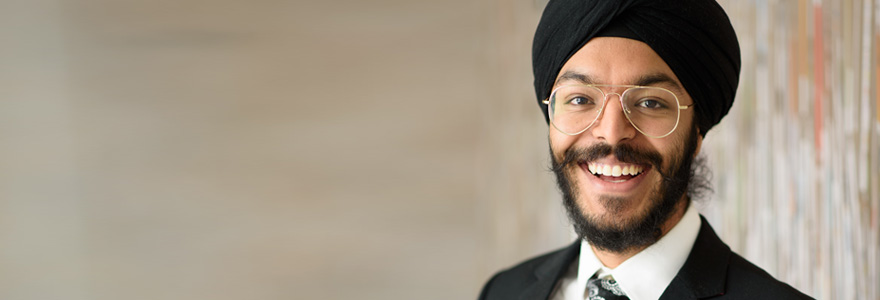Public health graduate driven by community service

By Emily Leighton, MA'13
Meet Sukhmeet Rohan Sachal, Canada’s future Minister of Health.
It’s an ambitious goal, but the 24-year-old isn’t afraid to voice it aloud. “It’s better to say it, to put it out into the universe, and then work hard toward achieving it,” he said.
And he’s now one step closer, graduating from Schulich Medicine & Dentistry’s Master of Public Health (MPH) program this month alongside 57 of his fellow classmates.
At a young age, Sachal’s resumé already boasts an impressive list of experiences, woven together by a deep sense of social responsibility.
It is a value that was instilled by his parents, who moved the family from India to Canada when Sachal was eight years old. As members of the Sikh faith, a pillar of the family’s belief system is selfless community service, known as Seva. “There is so much more to the world than just me and my life,”
Growing up in Surrey, BC, his first foray into community engagement came in grade school when he helped organize a Pow Wow event in response to a friend’s experience with racism. This led to the establishment of a friendship club, which still continues at the school to this day, to encourage intercultural exchange between students of different backgrounds.
Sachal is the co-founder of the Break the Divide Foundation, a non-profit organization that connects youth across Canada to inspire action around mental health and climate change. For his work with the organization, he was recently selected as one of the Top 25 Environmentalists Under 25 by The Starfish Canada.
Other community efforts have included Students Without Borders, fundraising to build wells in Kenya, and Five Days for the Homeless, sleeping outside to raise money and awareness for homeless communities.
In 2016, Sachal graduated with an undergraduate degree in anatomy and cell biology from McGill University. He then travelled to Inuvik, Northwest Territories to volunteer, spending time at a local secondary school and community hospital.
The physicians he met in Inuvik planted the seed of studying public health, something he hadn’t realized was a possibility. “I started researching, and realized I’ve been engaged in public health in some form or another for most of my life,” he said.
Arriving in London, Ontario to begin the MPH program, Sachal was happy with his decision to pursue graduate training in the field. “The MPH program re-ignited a spark inside me that I felt I was starting to lose,” he said. “It was the best decision I’ve made in my life.”
He says the case-based method and learning team environment provided opportunities to expand his critical thinking skills and gain new perspectives.
Throughout the 12-month program, Sachal took on a number of leadership roles and projects. He served as the class representative, introduced alumna Dr. Margaret Chan, MD’77, at the 2017 Dean’s Gala, and started a radio show called Health Hub with CHRW, the campus radio station.
A big highlight was his 12-week practicum placement with the Public Health Agency of Canada. During the placement, he completed two projects - one looking at cryptosporidium, a waterborne illness, and the other focused on chronic wasting disease.
“With the practicum, I was able to transfer skills from the classroom to the real world,” he said.
As an emerging public health leader, Sachal was recently selected to attend UNLEASH 2018 in Singapore, a global innovation conference built around the United Nations Sustainable Development Goals. Participants were divided into teams and tasked with developing innovative ideas to help address global challenges related to poverty, inequality, climate, environmental degradation, prosperity, and peace and justice.
Working with three teammates from Singapore, Syria and Zambia, Sachal helped develop a project that uses virtual reality (VR) to teach school children in Zambia about climate change. “With VR we can show them climate change in real-time, to help them understand the impact and how they can help prevent it,” he explained.
The project received a Gold Prize at the conference, and Sachal is still working with the team to bring the idea to fruition, first in Zambia, then in Northern Canada.
The busy professional is currently working as a case manager at the University of British Columbia’s School of Population and Public Health. In the role, Sachal engages urban Indigenous populations, trying to adhere them to treatment for Hepatitis C. The work takes him to East Hastings, an area of Vancouver that contains one of Canada’s largest homeless populations.
“We work with vulnerable communities to improve their health and wellbeing,” he explained. “And we want to do this using a holistic, culturally safe approach.”
Sachal is also currently working with the United Nations Association in Canada as a regional coordinator for the Vancouver area. “I’m working on the Truth and Reconciliation Calls to Action, recruiting students to participate in activities around reconciliation,” he said.
The new graduate has his sights set on medicine, with the hopes of becoming a rural physician and continuing to work alongside Indigenous communities.
As he looks to the future, Sachal’s message to his fellow classmates is a hopeful one. “Continue the work you’re doing, because it is making a difference,” he shared. “Your passion for public health is helping Canadians and people around the world.”


